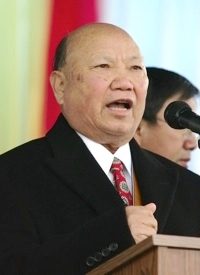
General Vang Pao, the heroic anti-communist leader of the Laotian Hmong, was laid to rest early in February during a six-day funeral held by his people in Fresno, California. Mourners from various parts of the United States were joined by some from as far away as Europe to bid farewell to the man who became somewhat of a patriarch of the Hmong people. Vang Pao was 81.
The leader of the resistance to communist rule during the Vietnam War, Vang Pao found himself recruited by America’s CIA into what became known as the “Secret War” as early as 1961. Working alongside American military personnel who clandestinely infiltrated into Laos, he and his forces fought for 15 years to keep from being overrun by the North Vietnamese under Ho Chi Minh as well as the communist Pathet Lao in their own country. After the communist triumph, General Vang and his followers were hounded by the North Vietnamese victors and many fled their native land. As many as 200,000 ended up in the United States, Vang Pao among them.
All during the Vietnam War, forces led by the legendary Hmong leader proved to be a huge thorn in the side of Southeast Asia’s communists. They blocked shipments of arms and other supplies traveling through what became known as the Ho Chi Minh trail snaking its way through their country from North Vietnam into South Vietnam. They rescued downed U.S. pilots and engaged the enemy in numerous bloody skirmishes. Toward the end of the war, however, Vang Pao confided to his American friends that the U.S. would quit the conflict and “as soon as that happens, the communists are going to take my country.” Sad to say, he was correct.
As far back as 1954, Vang Pao had demonstrated both his understanding of the evil of communism and his willingness to lead in any battle against it. In the area then known as French Indochina, the initial communist victory occurred when French forces were routed at the battle of Dien Bien Phu in that fateful year. Out of that conflict came the creation of North and South Vietnam, Laos and Cambodia. The man who then rose to lead his people rescued many of the defeated warriors from that conflict and quickly became a sought-after opponent of the communists. Later, when American military personnel who worked alongside him in the part of the Vietnam struggle known as the “Secret War,” they all saw the message posted on a sign at the entrance to his headquarters: “To be born a free man is an accident; to live one a responsibility; to die one an obligation.” Vang Pao lived by that creed.
Over the past several decades, approximately 200,000 Hmong refugees have entered the United States. Though difficult to know for certain, it is estimated that the Hmong people number about seven million worldwide, many now in Western China. Here in the U. S. most have settled in three states: California, Minnesota, and Wisconsin. But troubles that have dogged them continued even here as warrants were issued by federal courts in 2007 for the arrest of Vang Pao and nine others on charges that they were violating our nation’s Neutrality Act by plotting to overthrow the communist-led government of Laos. Vang Pao was freed on bail after 39 days in federal custody in 2007, the federal government dropped all charges against the general in September 2009, and the remaining charges against the others were finally canceled in January of this year.
All during the Vietnam War, the United States had no better ally in Southeast Asia than Vang Pao. Estimates placed the number of Hmong casualties during the war at 35,000 dead and 100,000 wounded. After the death of their heroic leader, requests were made by some of his people to inter his remains at Arlington National Cemetery with full military honors. But a policy allowing only American service personnel to be buried there prevented fulfillment of their desire.
Much of the story of Vang Pao and the Hmong people’s resistance to communism appeared in the book The Ravens written by Christopher Robbins. U.S. Air Force Sergeant Major R.D. Patrick Mahoney, one of our nation’s military personnel who worked alongside the Hmong general during the war, said that the book “will make you laugh as well as cry as it describes the sellout of Vang Pao and his country” by America’s leaders.
And a sellout it certainly was, just as betrayals of numerous others who wanted to resist communism (Chiang Kai Shek, Draza Mihailovich, Syngman Rhee, Moise Tshombe. Anastasio Somoza, et al.) found that having the United States as a friend can prove to be a kiss of death.
Photo: Former Laotian Gen. Vang Pao addressed thousands of supporters when he spoke at the Hmong International New Year’s Celebration, Dec. 26, 2007 in Fresno, Calif.: AP Images



